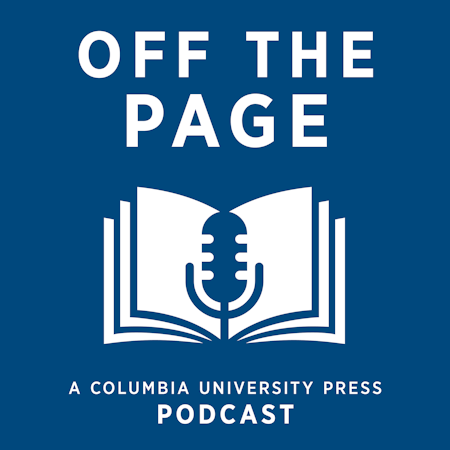
Off the Page: A Columbia University P...
Interviews with Columbia University Press authors.
251
Aaron Y. Zelin, "Your Sons Are at Your Service:...
An interview with Aaron Y. Zelin
59 min
252
Maria Stepanova, "The Voice Over: Poems and Ess...
An interview with Irina Shevelenko
45 min
253
Benjamin Ho, "Why Trust Matters: An Economist's...
An interview with Benjamin Ho
54 min
254
Lynne Huffer, "Foucault`s Strange Eros" (Columb...
An interview with Lynne Huffer
58 min
255
Tom Phuong Le, "Japan's Aging Peace: Pacifism a...
An interview with Tom Phuong Le
49 min
256
Margarita M. Balmaceda, "Russian Energy Chains:...
An interview with Margarita M. Balmaceda
44 min
257
Kevin McGruder, "Philip Payton: The Father of B...
An interview with Kevin McGruder
58 min
258
Aaron Passell, "Preserving Neighborhoods: How U...
An interview with Aaron Passell
25 min
259
Yves Agid, "Subconsciousness: Automatic Behavio...
An interview with Yves Agid
64 min
260
Hoyt Long, "The Values in Numbers: Reading Japa...
An interview with Hoyt Long
54 min
261
Kevin McGruder, "Philip Payton: The Father of B...
An interview with Kevin McGruder
31 min
262
Gayle Rogers, "Speculation: A Cultural History ...
An interview with Gayle Rogers
62 min
263
Yurou Zhong, "Chinese Grammatology: Script Revo...
An interview with Yurou Zhong
79 min
264
Peter E. Hamilton, "Made in Hong Kong: Transpac...
An interview with Peter E. Hamilton
69 min
265
Leah DeVun, "The Shape of Sex: Nonbinary Gender...
An interview with Leah DeVun
53 min
266
Nikki Usher, "News for the Rich, White, and Blu...
An interview with Nikki Usher
50 min
267
Stephen Murray, "Notre-Dame of Amiens: Life of ...
An interview with Stephen Murray
29 min
268
Peter Morey, "Islamophobia and the Novel" (Colu...
An interview with Peter Morey
58 min
269
Amaka Okechukwu, "To Fulfill These Rights: Poli...
An interview with Amaka Okechukwu
57 min
270
Eric Schluessel, "Land of Strangers: The Civili...
An interview with Eric Schluessel
69 min
271
Bernard E. Harcourt, "Critique and Praxis: A Cr...
An interview with Bernard E. Harcourt
66 min
272
Gavin Arnall, "Subterranean Fanon: An Undergrou...
An interview with Gavin Arnall
58 min
273
Justene Hill Edwards, "Unfree Markets: The Slav...
An interview with Justene Hill Edwards
49 min
274
Heath Brown, "Homeschooling the Right: How Cons...
An interview with Heath Brown
52 min
275
Michael L. Siciliano, "Creative Control: The Am...
An interview with Michael L. Siciliano
43 min